or keep pressing Tab key no navigate
Texas Southern University’s Transportation Studies students attended the Transportation Research Board of the National Academies of Science, Engineering and Medicine’s Annual Meeting in Washington, DC, January 4 – 9, 2025. The week’s highlight was the Chair’s Plenary Session hosted by TRB Executive Committee Chair and TSU’s, Dr. Carol Abel Lewis. The plenary session focused on innovation in transportation. Faculty members Mr. Edward Booker, Dr. Gwen Goodwin and Dr. Mehdi Azimi joined Dr. Lewis, along with TSU Alumnus and TRB staff member, Dr. Jamaal Schoby.
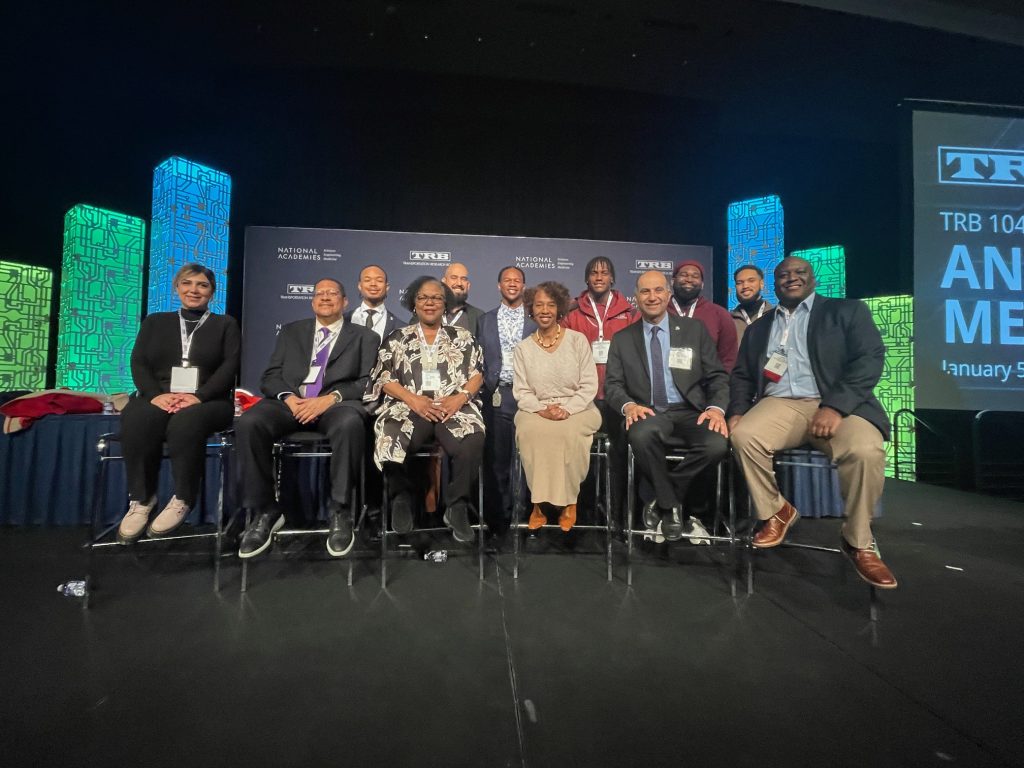
“Understanding Math Functions and Operations via Graphing” is a comprehensive guide that simplifies the intricate world of math functions through the power of visual representation. This book takes a unique approach by utilizing graph theory to illustrate fundamental mathematical operations, making it easier for readers to grasp abstract mathematical concepts. The book leads readers on a journey of discovery and understanding from basic functions to advanced operations. Whether you are a student looking to strengthen your math skills or an educator seeking innovative teaching methods, this book is an invaluable resource that will transform the way you perceive and interact with mathematical functions.
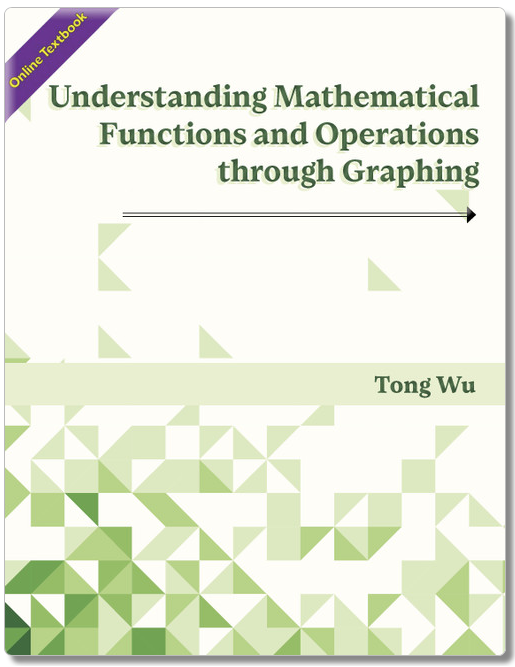
Tong Wu is a passionate mathematician and educator with expertise in graph theory and mathematics functions. She holds a M.S. degree in mathematics and have been teaching math concepts to students of all levels for over thirty of years. Through her dedication to simplifying complex mathematical concepts, she has inspired countless students to develop a love for math.
This National Science Portal project comprises a multidisciplinary team of experts in applied mathematics, physics, statistics, optimization, machine learning, and materials scientists from Texas Southern University, Prairie View A&M University, Texas A&M University, and University of Michigan. The center’s primary objective is to develop a foundational SciML framework that will drive advancements in materials design and discovery.
This Center places a strong emphasis on knowledge development and building diversity in the scientific community, fostering the growth of SciML and Data Science programs in Historically Black Colleges and Universities (HBCUs) and Minority-Serving Institutions (MSIs), and actively involving undergraduate and graduate students in cutting-edge research.
The center will develop a foundational SciML framework that will drive advancements in materials design and discovery. By focusing on the Electron beam powder bed fusion (EBPBF) platform, the center will leverage the inherent equivalence between electron beam processing and scanning electron microscopy, utilizing sensor data to facilitate data-driven and principle-guided scientific exploration. The research activities will involve the development of mathematical models such as Bayesian neural networks and sparsified SciML models, with the potential for broader application in various fields.

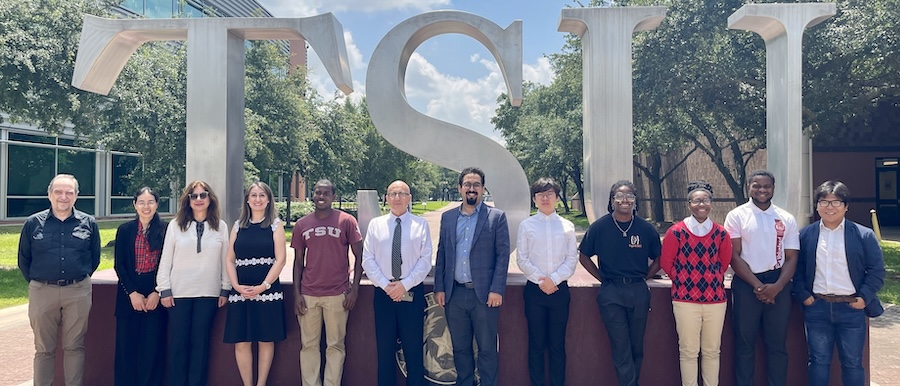
Air Force Office of Scientific Research, Award no. FA9550-23-1-0725
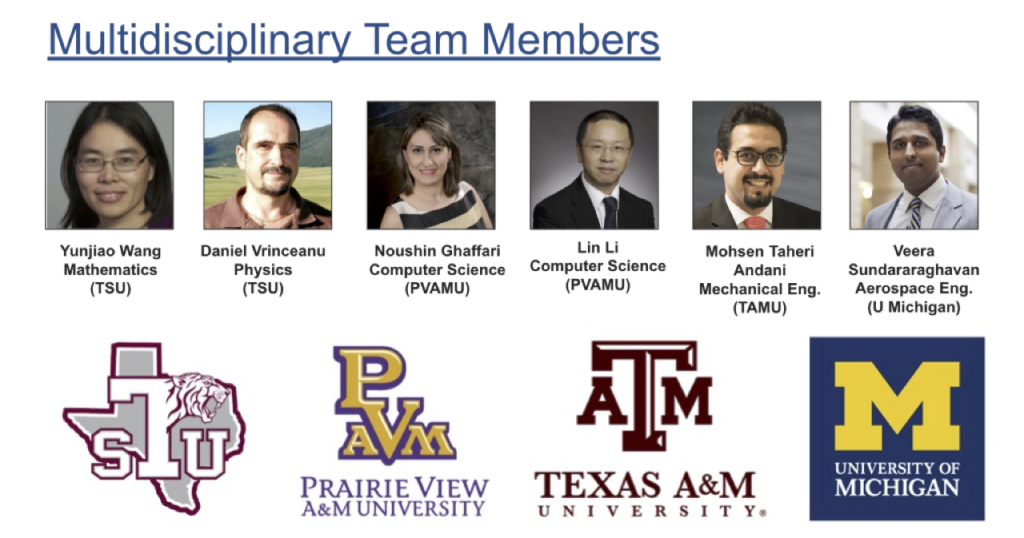
Graduate Students
Undergraduate Students
The High-Performance Computing Center (TSU-HPCC) at TSU (directed by PI Vrinceanu) was established in 2008 to promote research and training on campus by integrating leading-edge high-performance computing and visualization for the faculty, staff, and students of TSU. TSU-HPCC provides consulting and assistance to campus researchers with experimental software and/or hardware needs and training in parallel and grid computing. The software/support that will be provided includes
(1) generic operating systems, compilers, and libraries of common use in scientific communities, and tools for concurrency and parallelism,
(2) specialized quantum chemistry packages that include Gaussian, Molpro, and VASP,
(3) machine learning software, such as TensorFlow, Spark, PyTorch, and Bioconductor
(4) molecular dynamics and atomistic simulation packages, such as LAMMPS, GROMACS, and VMD, that include molecular visualization facilities and
(5) bioinformatics packages for genetic analysis, sequencing, alignment, and annotation.
The Department of Mathematics has a computer lab that offers the relevant technology to help students learn mathematics and its applications. The available software applications include Microsoft Office, Matlab, Maple, R and R-Studio.
The research team has essential hardware for this project, including Macbooks, Dell laptops, NVIDIA Jetson Nanos, and an NVIDIA DGX workstation with a powerful Intel Xeon E5-2698 CPU and 4 NVIDIA Tesla V1000 GPUs. The PIs have access to the Deep Learning Lab’s NVIDIA DGX-1 systems, featuring eight Tesla P100 GPU accelerators each and providing impressive performance for big data analytics. Teaching and training activities will occur in the Department of Computer Science, furnished with large classrooms and well-equipped computer labs.\
U-M provides a comprehensive computing environment with data acquisition, data processing, and graphics development capabilities. The university has licenses for high-performance compilers and mathematical tools. ARC-TS maintains the Great Lakes Slurm High-Performance Computing (HPC) cluster, allowing researchers to focus on research. The cluster has approximately 13,000 CPU cores, access to GPUs and large-memory nodes, and also supports emerging uses like machine learning and genomics. ARC-TS also provides storage infrastructure and a local online file system for a total of 1530 TB. The Center for Advanced Computing provides software support and licenses for widely used software. Dr. Sundararaghavan’s group has dedicated access to computational resources through the PRISMS program and an NSF XSEDE allocation.
Prof. Andani at TAMU has a dedicated space equipped with resources for metal processing and characterization, which includes the Freemelt ONE, an open-source electron powder bed system.
We will leverage the unique features of the Freemelt ONE system in this project. Its small vacuum chamber provides advantages for experimenting with different material systems. We plan to utilize the system’s additional ports for real-time monitoring of the manufacturing process, using tools such as the Backscatter Electrons (BSE) detector and X-Ray Detector. The open-source platform of the system allows for customization of the size and movement of the electron beam, enabling us to optimize the melt process sequencing. Throughout the process, we will consider insights from microstructure modeling and focus on each individual time stamp to achieve the desired results.
[1] T. D. Truong, H. You, M. T. Andani, Unveiling spot melting strategies for microstructure control in electron beam powder bed fusion, 2024 Annual International Solid Freeform Fabrication Symposium (SFF Symp 2024).
[2] H. You, T. D. Truong, M. T. Andani, Exploring the Impact of Island Spot Scanning on Microstructural Texture in Ti-6Al-4V Fabricated by Electron Beam Powder Bed Fusion, 2024 Annual International Solid Freeform Fabrication Symposium (SFF Symp 2024).
The center currently currently has multiple undergraduate and graduate research assistantships available. Any student who has a strong academic background in math, physics, or computer science are encouraged to apply.
If you are interested, please send the following documents to Dr. Vrinceanu (Daniel.Vrinceanu at tsu.edu) or Dr. Wang (Yunjiao.wang at tsu.edu):
Supported by Air Force Office of Scientific Research, the Center for Scientific Machine Learning for Material Science (CSML-MS) invites undergraduates interested in data science to apply for the Summer Undergraduate REsearch program in Data Science (SURE-DS) this summer 2025. The details will be posted in the Spring of 2025.
Title: Introduction to Materials Science and Metal Additive Manufacturing
The Center for Scientific Machine Learning for Material Science invites students and researchers to participate in a short course on Introduction to Materials Science and Metal Additive Manufacturing. This course offers a unique opportunity to learn about the latest advancements in metal additive manufacturing and the foundational knowledge of materials science essential to understanding these cutting-edge processes.
The lectures will be led by Dr. Taheri Andani’s research group at Texas A&M University, experts in metal additive manufacturing and materials science. Participants will gain insights into how materials science principles are applied to optimize additive manufacturing techniques, with detailed exploration of process mechanics and materials behavior.
Course Schedule:
Don’t miss this opportunity to learn from leading experts in the field
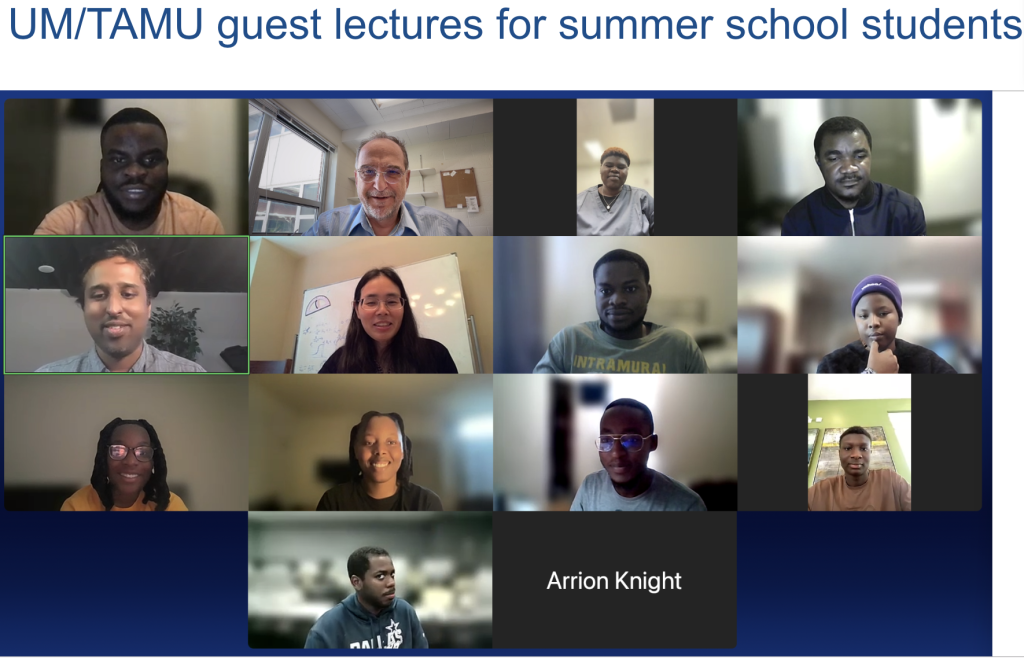
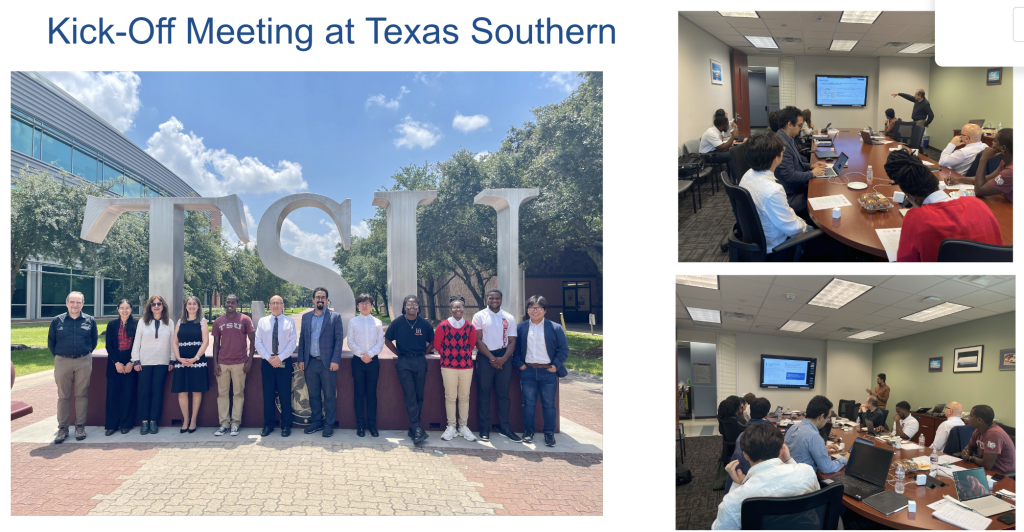
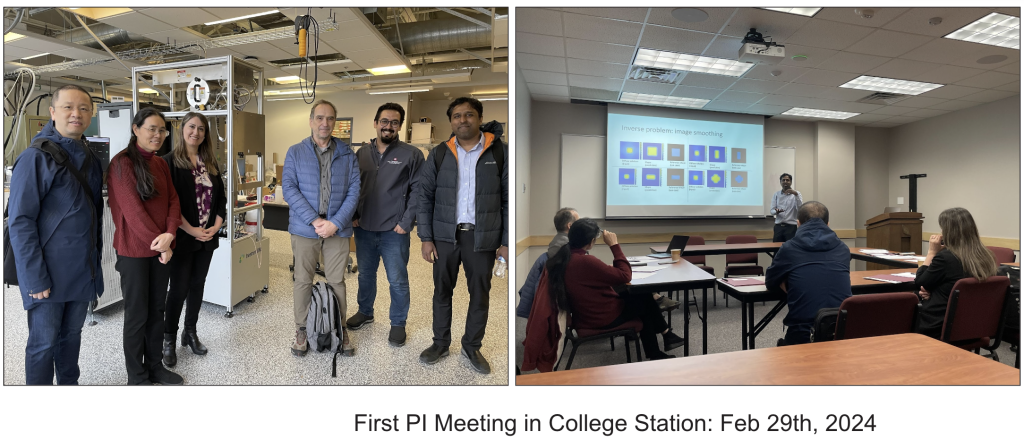
Improving Access to Career and Educational Development for Talented, Low-Income Students through the Flexible Internships-Research-Education Model (I-ACED) is a multi-institutional NSF backed program integrating internships and research experiences to prepare students for careers in engineering and STEM fields.
Benefits to I-ACED Award Recipients
The application at I-ACED.org is open until July 1, 2024, or July 15, 2024 (TSU Graduate School application deadlines).
Contact information: Dr. Azime Saydam (azime.saydam@tsu.edu) or Dr. Lila Ghemri (lila.ghemri@tsu.edu)
When: 09/21/2023
Where: TECH 216
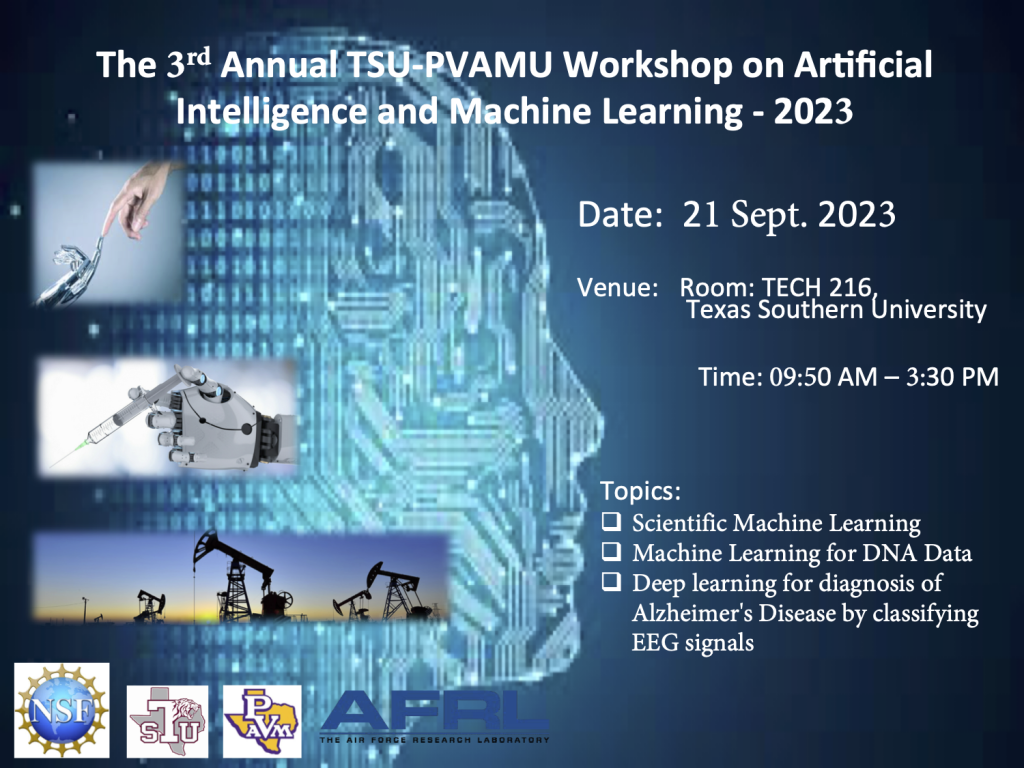
May 3, 2023
Location: SB 158
Time: 12:00 pm
Presenter: Dr. Nancy L. Glenn Griesinger
Harnessing Artificial Intelligence for Cancer Prognosis and Prediction: The Statistician’s Crucial Role – A Comprehensive Sequel
Abstract: Building upon last month’s award-winning presentation, this one-hour sequel delves into the resurgence of artificial intelligence (AI) and its application in machine learning for cancer prognosis and prediction. The discussion will include the relevance of computational biology and the incidence of intestinal polyps in ApcMin/+ mice, highlighting the connection between intestinal polyps and colon cancer from a clinical perspective. This joint presentation’s main focus will be the integral role of statisticians in developing predictive models using machine learning, as well as the benefits of utilizing nonparametric empirical likelihood theory based statistical models. We can achieve more accurate predictions by employing empirical likelihood and reducing dependence on distributional assumptions.
Nancy L. Glenn Griesinger is a tenured professor of mathematics and statistics with a Ph.D. in statistics from Rice University, who has been teaching at the university level for 21 years at universities in Texas, South Carolina, and California. Dr. Griesinger is also the founder and CEO of Mobile Math, LLC, a mathematics tutoring agency.
Light lunch will be provided.
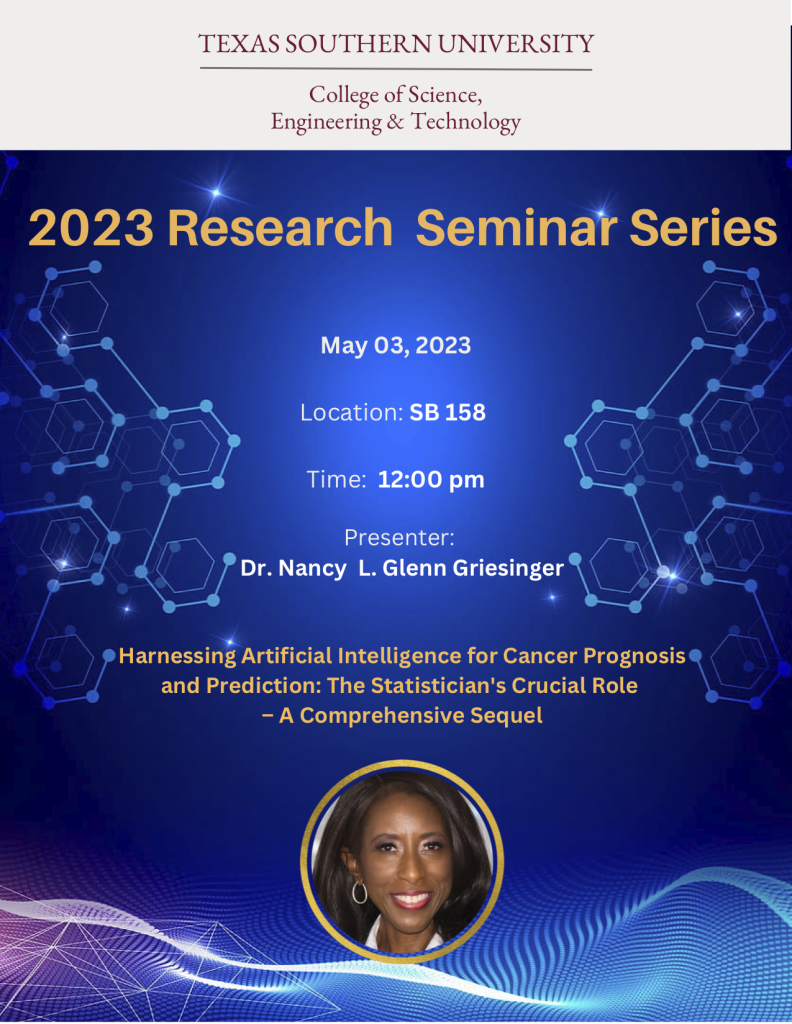
Location: SB156
Title: The hierarchical organization of the Drosophila connectome
Abstract: The Hemibrain is the largest published connectome to date. It is the result of a dense reconstruction of over twenty thousand neurons and ten million synapses spanning the fruit fly Drosophila central brain. I will describe a novel approach to uncovering the hierarchical community structure of this connectome. This approach allows us to recover previously known essential to interpret the forthcoming connectomics data due to its size and complexity.
Bio:
Dr. Krešimir Josić is a John and Rebecca Moores Professor in the Department of Mathematics at the University of Houston with adjunct appointments in Biology and Biochemistry at UH, and BioSciences at Rice. He received his PhD in 1999 in applied dynamical systems. Over the last 20 plus years he has worked in different areas of mathematical biology, with a focus on understanding the structure of neuronal activity, and modeling single celled organisms from the level of signaling pathways to large microbial populations.
Professor Josic has published over 100 research papers published in top journals and one book, and received over a dozen of NSF and NIH grants. He has supervised 15 postdocs and 17 Ph.D students. He has also supervised many master students, undergraduates and high school students. In addition, he contributes to the program Engines of Our Ingenuity which is broadcast by over 50 NPR stations nationwide. See more on his webpage: https://www.math.uh.edu/~josic/
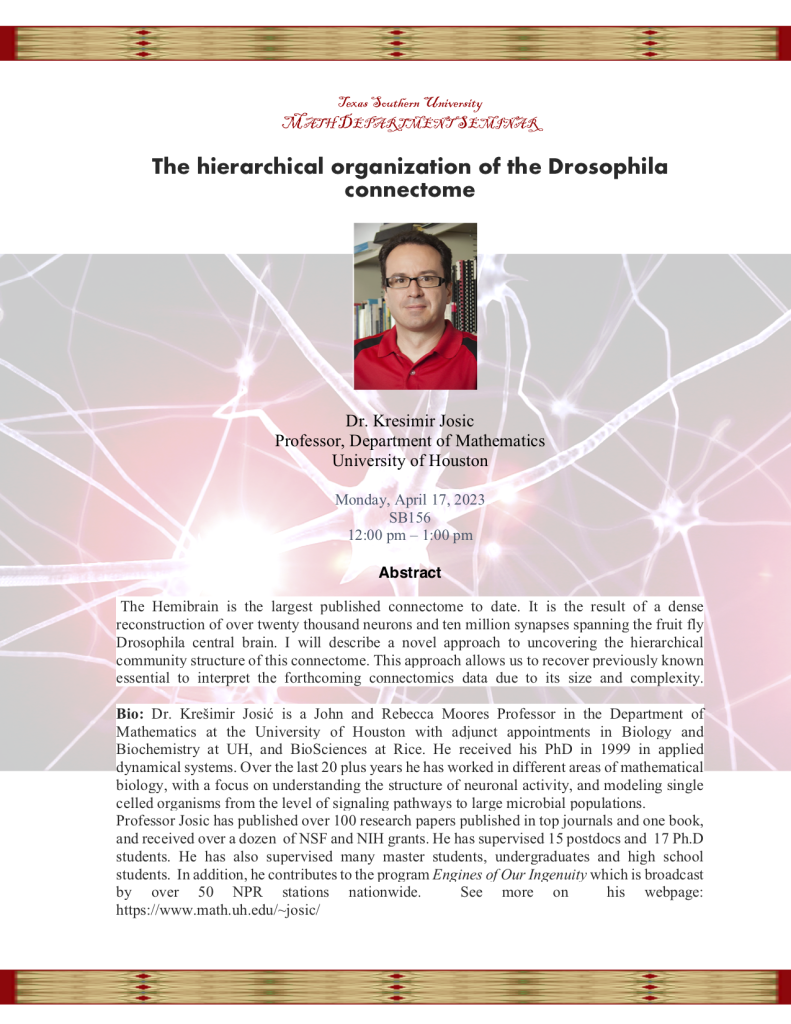
April 12, 2023
Location: SB 156
Time: 12:00 pm
Presenter: Debra Dianne Murray, Ph.D.
“The All of Us Evenings with Genetics Research Program”
Abstract:
There are several barriers to academic career advancement and obtaining external research funding that co-exists with research productivity for many underrepresented groups. The Molecular and Human Genetics Department at Baylor College of Medicine (BCM) will use the All of Us database to assist these groups by increasing representation, creating more accessible research opportunities, building networks in diverse fields, ensuring the success of all early career underrepresented biomedical researchers. The All of Us (AoU) Evenings With Genetics (EwG) Research Program at Baylor College of Medicine, a researcher engagement program, includes The AoUEwG Campus Seminar, AoUEwG Student Townhall, the Biomedical Researcher (BR) Faculty Summit (FS), and All of Us BR Scholars Program.
Debra D. Murray, Ph.D., a leader in diversity and inclusion, mentoring, and research education, is a 2021 recipient of the Norton Rose Fulbright Faculty Excellence Award in Educational Leadership. As a MPI, she recently was awarded the All of Us Evenings With Genetics Research Program from the NIH All of UsResearch Program. Dr. Murray is Director of Education and Diversity Initiatives in the Human Genome Sequencing Center (HGSC), and an Associate Professor in the Molecular and Human Genetics Department and former co-Director of the Office of Community Engagement and Diversity at Baylor College of Medicine (BCM). In this role, she focuses on faculty training and increasing diversity in the medical genetics’ programs. She is a part of the Engagement, Communication, and Education (ECE) Team that provides community engagement research and activities for the Intellectual and Developmental Disabilities Research Center (IDDRC) and is co-PI on a PCORI “Building Capacity in Hispanic Serving Institutions for PCOR/CER focused on Mental Health Impacts of COVID-19″.
Light lunch will be provided.
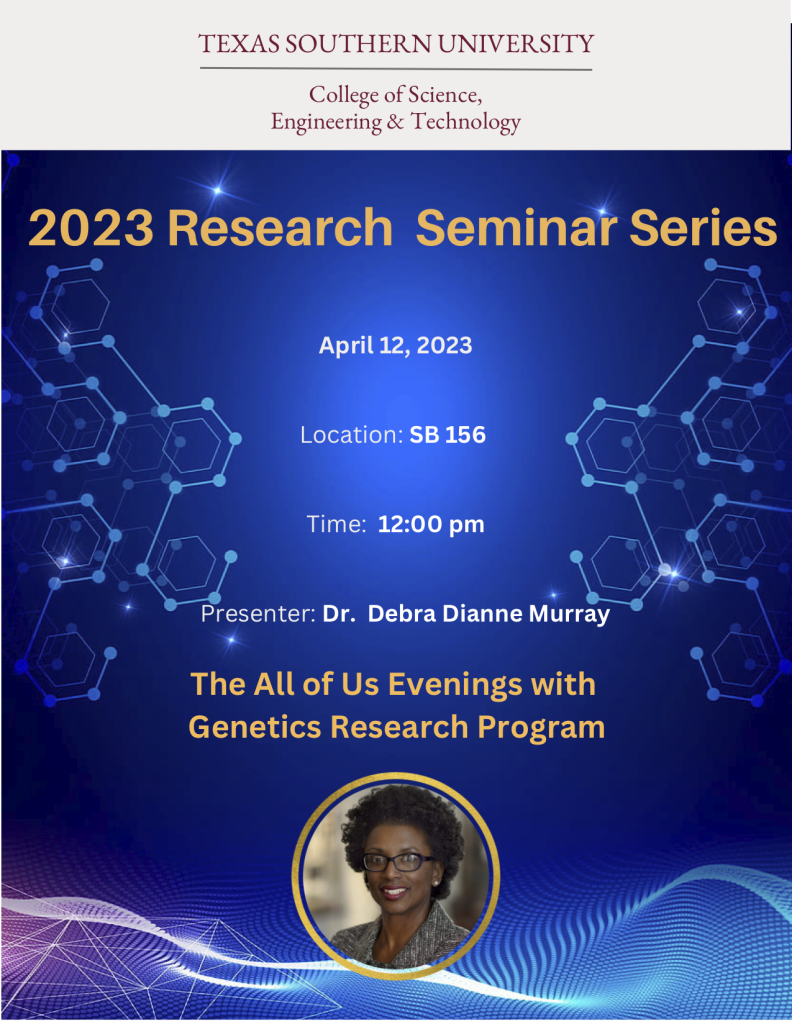
March 29, 2023
Location: SB 156
Time: 12:00 pm
Presenter: Yunjiao Wang
“Modelling Binocular Rivalry”
Abstract:
Binocular rivalry is a phenomenon that occurs when two dissimilar images are presented to different eyes simultaneously: instead of seeing one coherent image, one experiences percept alternating between different images. In this talk, I will discuss network models that may account for the phenomenon.
Light lunch will be provided
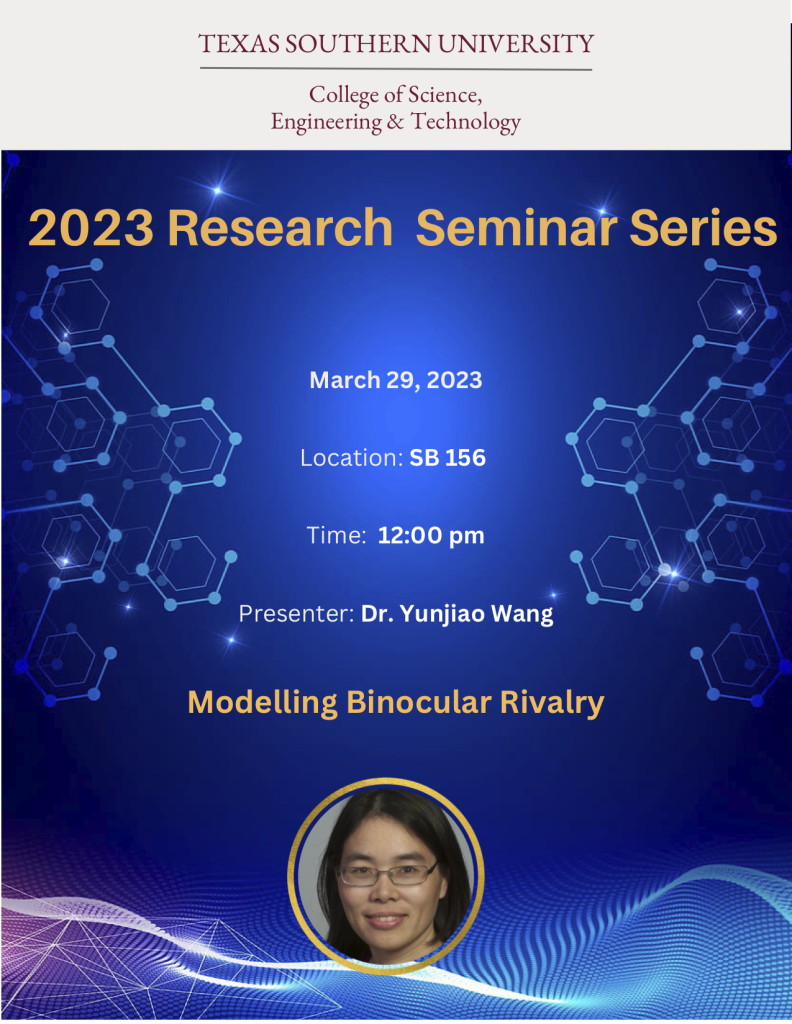
Dr. Glenn Griesinger is recognized as the “Black History Month 2023 – Honoree of the Day” by Mathematically Gifted and Black (https://mathematicallygiftedandblack.com/honorees/nancy-l-griesinger/).
Congratulations!
This posts Contains a sample of Symphony of Brotherhood Featuring Dr. Martin Luther King Jr. by Miri Ben-Ari courtesy of ℗© 2007 The Music Movement All Rights Reserved.
JOINT MATHEMATICS & PHYSICS COLLOQUIUM
Non-Relativistic Fermionic Quantum Mechanics (Cracking Schrödinger Nutshell)
Young Lee
Department of Physics, Texas Southern University
Young.Lee@tsu.edu
Tuesday, September 25, 2018 2:30 pm – 3:30 pmTexas Southern University Science Building, Room 146
Abstract
The non-relativistic Schrodinger equation was formulated nearly 90 years ago and has been successfully applied to various quantum mechanical systems across multiple scientific fields producing the main developments to quantum theory. The primary importance of Schrodinger’s equation arises in the implementation of the analogue of Newton’s law and continuation of classical mechanics. In the development of relativistic quantum physics, Dirac expanded the theory combining Einstein’s special relativity, quantum mechanics and the so- called fermion particle of half integer spin. This was the first theory to consistently account for special relativity within the context of quantum mechanics. In this paper, we formulate a novel mathematical approach to solve Schrodinger’s equation within the context of particle and wave theory. In our examination, we present a similar, yet unique model of fermion structure, which is consistent with the present day Dirac description. We will introduce and discuss the 1 dimensional structure of a Harmonic oscillator and free particle fermionic state. Additionally, the 3+1 dimensional structure of the fermionic state will be briefly outlined. Finally, we will compare our model with Dirac’s theory for further study. This model is not Lorentz invariant; however, the connection of classical and non-relativistic quantum theory will be explained. We will also talk about the Hydrogen atom within the framework of bound state, fermionic quantum physics.
Download the flyer .
The department of Mathematics at the Texas Southern University will hold a conference on 9/22/2018-9/23/2018 with a tentative title ‘Invitation to Mathematics’
Goals of the conference are:
Please download the flyer or visit the conference page.
Mathematics Department Seminar: Careers in Biostatistics by Dr, Lem Moye, University of Texas Health Science Center at Houston. 3-4 pm Nov. 2, SB 153. Click here to view pdf more.